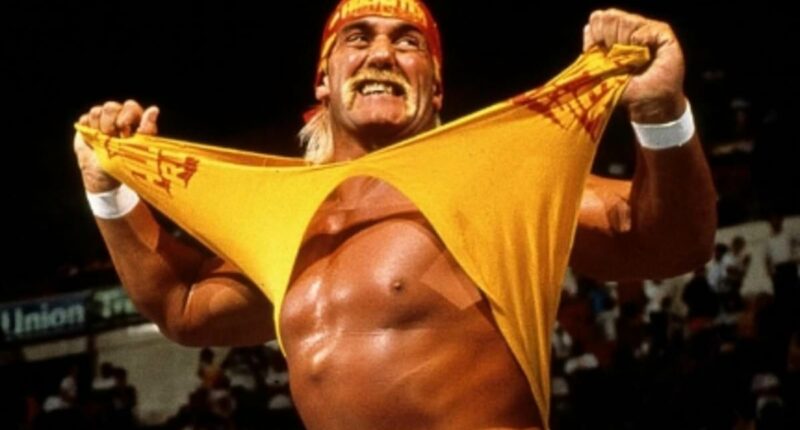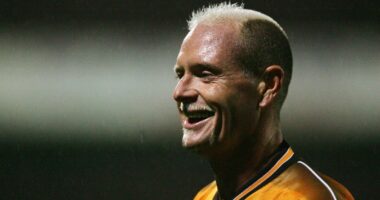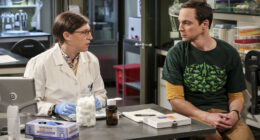Share this @internewscast.com
As the wrestling world struggles to come to terms with the shocking news of Hulk Hogan’s sudden passing, fans have been left asking: could his death have been connected to steroid abuse?
Hogan, real name Terry Bollea, was arguably the most famous wrestler of all time, enjoying mega stardom in the 1980s due to his affiliation with WWE, and starring roles in a series of movies, including a co-starring role with Sylvester Stallone in Rocky III.
Famed for his iconic bleached blond mane and handlebar moustache, for the perma-tanned muscle man—who in his prime stood 6″7 tall—image was everything, and the pressure to always be the biggest in the ring saw him turn to illegal substances.
When he first joined WWE, then known as the World Wrestling Foundation, he became an iconic emblem of American pride and morals, entering the arena in his trademark yellow and red to a rousing, patriotic, soundtrack..
He told his devoted young fan base, dubbed the Hulkamaniacs, to take their vitamins, say their prayers, respect their parents, and always do their best, but by the early 1990s his public image had taken a downwards turn.
In 1991, he was forced to deny that his gargantuan build was the result of long-term steroid abuse, only to U-turn while under oath in a 1994 trial against his former employer where he admitted to taking them for over 13 years.
Anabolic steroids are powerful, manufactured, drugs that mimic the effects of the testosterone.
They’re prescription only, and given to stimulate muscle growth following surgery and to treat some kinds of anaemia.
However, due to the way they increase testosterone—the hormone responsible for muscle growth, endurance and strength—they are often abused, particularly by body builders and people who play combative and competitive sports.
The drugs, which are classed as a Class C in Britain and a schedule III in the US, are addictive and have a catalogue of serious side-effects.
Steroids affect the growth of the body’s muscles, which includes the heart, and have been linked heart attacks, heart failures, arrhythmias—an irregular heartbeat—and cardiomyopathy, a chronic disease of the heart muscle.
Last year, Hogan told podcaster Theo Von that he, and other professional athletes, used steroids for faster healing, even after they were made illegal.
He said: ‘When it became illegal, we kept yoking up because we were out tearing biceps like this that wouldn’t get fixed, and muscle tears everywhere.’
While it is hard to pinpoint the exact cause of his heart attack, it is likely that years of steroid abuse would have left a lasting effect on his body.
A source close to Hogan’s family told the Daily Mail the WWE star knew he was suffering from a ‘very weak’ heart in his final weeks.


Prominent American Wrestler Hulk Hogan has died of a heart attack yesterday at the age of 71
The steroid controversy
In 1991 Hogan was named in a lawsuit which alleged that his boss Vince McMahon had been giving his stable of wrestlers illegally sourced steroids.
Despite McMahon advising against it, Hogan made an appearance on The Arsenio Hall Show where he denied taking the drugs. but admitted to once being prescribed ‘male hormones’ to help him recover from an injury.
He said: ‘I trained 20 years two hours a day to look like I do. But the things that I’m not, I am not a steroid abuser and I do not use steroids.’
In 1994, this was proved to be a lie when he was given immunity from prosecution so he could testify in the case against WWF promoter McMahon.
He said McMahon had never asked him to take steroids and instead revealed he had taken them under his own prescription for medical purposes.
The admission destroyed his reputation as a clean living role model, and he decided to take a leave of absence from the World Wrestling Federation (WWF).
He later left the organisation to join rival wrestling competition, the World Championship Wrestling (WCW).
Hogan during the 1990s had a very different physique to his 1980s heyday, with many fans believing that his leaner shape was down to no longer using illegal substances to increase his bulk.

The WWE star said he took steroids on prescription for his own medical use after speculation
His painkiller addiction
The wrestler told Muscle and Health in 2023, that despite now being sober, he had suffered from an addiction to prescription pain pills.
This addiction was developed, he revealed, after he underwent 25 surgeries to fix decades of wrestling injuries which had left him in excruciating agony.
These included ten spinal procedures, facial operations from being kicked, knee and hip replacements and abdominal and shoulder surgeries.
‘I needed pain meds at that stage, that’s for sure. But once things started to wind down, they continued giving me the same points,’ he said.
Then he was ‘like a dog chasing a bone’, getting his fix when he went to pick up the prescription pills.
But he said: ‘Then, finally, I just looked at myself and said, “I’m not in pain. I don’t need this. My body hurts from all the injuries, but I’m not in excruciating pain.”‘
He credited CBD with helping him go down a healthier route after becoming too reliant on the prescription kill.
However, a study last year suggested CBD pain relief products do not work, and may be harmful to health.
His relationship with alcohol

The wrestler previously shared that he decided to cut out alcohol completely in an interview
The WWE star also revealed why he had decided to not drink anymore alcohol during his interview with Muscle and Health.
‘I’ve had a lot of practice drinking because I wrestled for about forty years, so those guys have a beer every once in a while,’ he said.
‘But about seven months ago I decided not to drink any more alcohol. I was at a New Year’s Eve party, and I saw a bunch of stuff that I didn’t condone or like.
‘I saw myself in this environment and I went, “You know what? I don’t know how I got here, but I’m done.”
‘I was around people who believed and behaved different from me, and I just said, “I’m out.”
‘It feels much better to be so clear headed. I’m no longer tempted to drink alcohol.
‘I don’t have an addictive personality. I mean, with anything. It can be business or people or alcohol or drugs. When I’m done, I’m done.’
He continued: ‘I’ve had certain wrestlers look at me in the face and go, “If you don’t have a drink with me, you’re not my friend.” I say, “Well, I am your friend, but I’m not going to drink with you. What are you going to do about it?”‘
His death
On Thursday morning, EMTs rushed to Hogan’s home after a 911 call said the legend was suffering from serious heart problems.
He was stretchered away onto an ambulance and taken to Morton Plant Hospital, where he was pronounced dead.
The source who disclosed his heart health, said: ‘He was suffering from shortness of breath, got tired easily, had lost a lot of weight and was on oxygen.’
But there was happiness and contentment during Hogan’s final weeks too, they added.
The wrestler spent time trying to heal rifts with estranged loved ones because he knew it would be his final chance to do so.
‘He had a lot of scores to settle. Didn’t want to leave anything unsaid,’ Daily Mail’s source said.
However, there was an outpouring of tributes from friends in the hours since the WWE stars passing.










